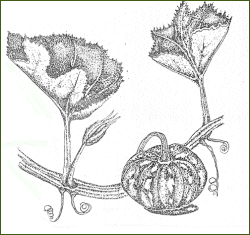 |
 |
CUCURBITA MOSCHATA - CALABAZA. Common name
Common namePumpkin, winter squash, calabaza, West Indian pumpkin, zapallo,labu manis, butternut squash, Cuban pumpkin, seiyou, auyama, ayote, kalamasa. Family Cucurbitaceae (Marrow family). Overview Calabaza is a squash variety, grown throughout Central - and South America as well in the Caribbean. It is a creeping, annual tropical vine with large lobed leaves and branching tendrils; the flesh of the fruit is bright orange. These pumpkins are monoecious, having both male and female flowers on the same plant. The flowers are yellow and pollination is done by bees. The taste is sweet and Calabaza is used in many local dishes. A vegetable that is a very good source of vitamin B; shoots and flowers contain calcium, phosphorus and iron. The fruit also contains calcium, vitamin A, lutein, riboflavin, thiamine and both alpha and beta carotene while the seeds are rich in zinc. Cuban pumpkin has mottled grayish green leaves. There are also medicinal applications of winter squash. The seeds are edible and have medicinal applications such as helping to prevent a common type of kidney stones. The yellow flowers are used against jaundice, while the flowers, leaf tips and the top are used as a vegetable. West Indian pumpkin can be grown world-wide from the tropics to the temperate zones. The fruit is almost round and can range in size from larger than a watermelon to as small as a grapefruit. Sometimes a calabaza can weigh up to 50 pounds and there are many varieties it! Suriname's Traditional Medicine Tea from the leaves is used against stomach inflammation and jaundice. The seeds of Cucurbita species are also used; to immobilize and aid in expulsion of intestinal worms and parasites. Another application is using the seeds as a remedy for prostate gland disorders; they have been found adequate in reducing swelling of the gland and it also regulates diuresis. The seeds contain phytosterols which may responsible for shrinking of the enlarged prostate gland. The Cherokee Amerindians and those from Surinam used pumpkin seed as an anthelmintic and also as a pediatric urinary aid to handle bed-wetting. Hardiness USDA zone 9B - 11. Can be planted and grow up to zone 7 in spring after the danger of frost has passed; gets full ripeness in August. Propagation Seeds and cuttings. Culture Full sun, needs rich, warm soil; water regularly. Sow only after the threat of frost has passed. |
For the right freight rate, shipping charges, conditions and delivery service, please visit our Webstore page! |